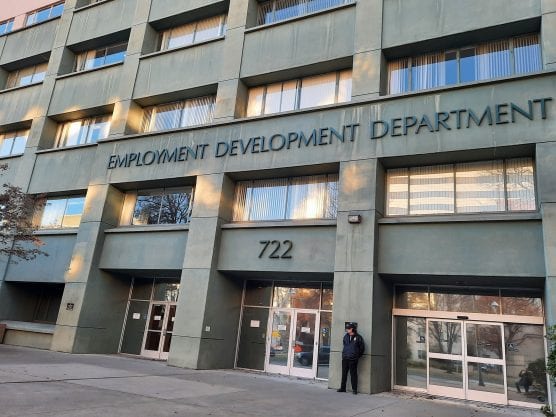SACRAMENTO, Calif. (CN) — Inmates and imposters ran up a $10 billion tab on California taxpayers’ dime during the opening stretches of the pandemic, taking advantage of the state’s dithering and deficient management of its massive unemployment benefit system, according to a new state audit.
With millions of new unemployment claims swamping the system, State Auditor Elaine Howle says the Employment Development Department buckled and issued payments for over four months without first verifying identities. As a result, the audit found that nearly 10% of the $111 billion in unemployment benefits the state paid as of December 2020 were fraudulent, including hundreds of millions to inmates.
In her second scathing audit of the department this week, Howle says the agency didn’t take the fraud threat seriously despite warnings from the federal government, and that deserving claimants are still bearing the impact of the department’s failures.
“The department did not make any substantive changes to its fraud detection practices until late July 2020 — four months after the pandemic‑related shutdowns led to a surge in unemployment insurance claims,” the audit states. “The department may well be using ineffective fraud prevention and detection techniques and delaying payments to legitimate claimants while it puts their claims through additional and unmerited review.”
The troubled department’s woes have been highly publicized over the last six months, namely a persistent backlog, but the full scope of its shocking incompetence came to light last November.
In an investigation spurred by corrections officials who overheard inmates bragging about receiving unemployment claims, a group of local and federal prosecutors announced thousands of incarcerated Californians had been scamming taxpayers.
Inmates using sophisticated pseudonyms like “Poopy Britches” and “Dianne Feinstein” received checks or debit cards, while hundreds of thousands of freshly unemployed Californians couldn’t even get the department to answer their phone calls. The press conference further humiliated the department that has routinely stained the state’s pandemic response.
“The fraud is honestly staggering,” said Sacramento District Attorney Anne Marie Schubert during the press briefing, claiming that benefits even made it to death row.
Largely due to the department’s failure to cross-check applicant names with those incarcerated, the audit estimates over $800 million has gone to inmates.
According to the audit, the department did little to increase its fraud safeguards even as other states were dealing with similar issues. Howle says the U.S. Department of Labor issued various warnings about the increased potential for fraud last spring and that California was at particular risk due to the millions of new claims it was receiving.
Nonetheless, the department was caught flat-footed and even when it identified likely fraud, didn’t quickly act.
For example, the department flagged 26,000 addresses as suspicious due to the high volume of claims yet only blocked claims to 10,000 of the homes. During their investigation, auditors uncovered that 80 total claims and over $300,000 had been paid to one single address. In another jarring example, 1,700 claims had been filed from one individual address.
Howle found it took the department until September to begin cracking down on the suspicious homes and implement tougher anti-fraud procedures.
“The department delayed responding to instances in which an unusually high number of claims under different names were filed from a single address,” Howle said in the report to the Legislature.
Thursday’s report prolongs what has been a difficult week for the department.
New director Rita Saenz acknowledged during a press conference Monday the department was “clearly under-prepared” for the high volume of claims and the criminal attacks. In addition, she said it’s possible the department paid up to $30 billion in fraudulent benefits.
Howle’s companion audit Tuesday slammed the department for answering less than 1% of the phone calls it received during the height of the pandemic and for not having a plan to address claim surges that happen during every recession.
In response to the audits, Saenz highlights the strain the department was under having received 6.5 million claims during the first half of 2020 alone — up from 3.8 million during 2008 and 2009. She also said most of the fraud was directed toward the federal Pandemic Unemployment Assistance program and shifted blame to former President Donald Trump.
“The Trump administration provided insufficient support to states to address the aggressive attacks by domestic and international criminal syndicates,” Saenz said while noting the department was able to root out 1.6 million bad claims worth $16 billion.
Saenz’s explanation didn’t sit well with the venerable auditor.
“The department does not acknowledge earlier warnings about potential fraud and its own failure to respond quickly to those warnings,” Howle countered. “Because the department did not take prompt action to enhance its safeguards against fraudulent benefit payments, it paid about $10.4 billion for claims from March through December 2020 that it has since determined could be fraudulent.”
Going forward, Howle says lawmakers should require the department to check with state and local correctional facilities to ensure applicants aren’t incarcerated and require the department to biannually assess its fraud prevention systems.
As for the department, Howle recommends it review the lengthy list of accounts that have been suspended due to fraud concerns and quickly unlock the legitimate ones.
A bipartisan group of lawmakers is pushing for a series of emergency oversight hearings regarding the department’s shortcomings to begin next week, while a California congressman has asked the IRS to intervene and the scores of identity fraud victims.
— By Nick Cahill, CNS
Like this:
Like Loading...
Related





 Tweet This
Tweet This Facebook
Facebook Digg This
Digg This Bookmark
Bookmark Stumble
Stumble RSS
RSS


























REAL NAMES ONLY: All posters must use their real individual or business name. This applies equally to Twitter account holders who use a nickname.
0 Comments
You can be the first one to leave a comment.